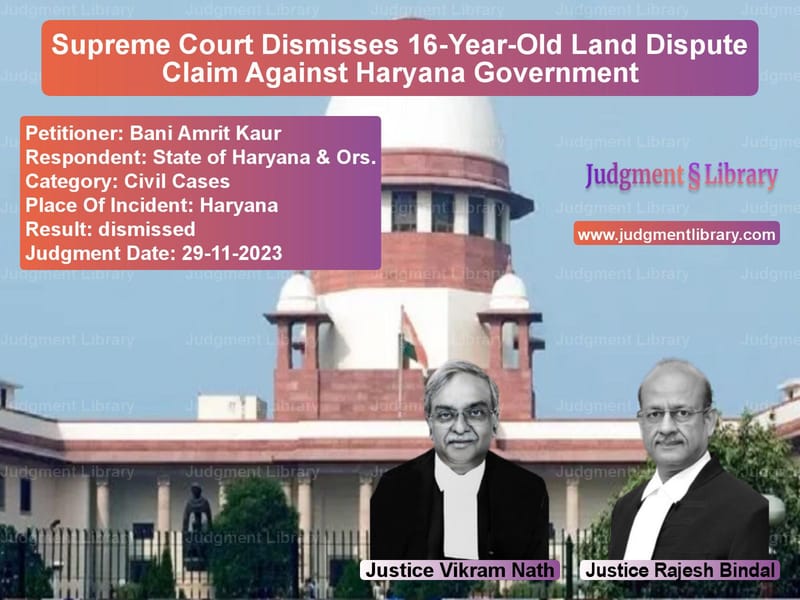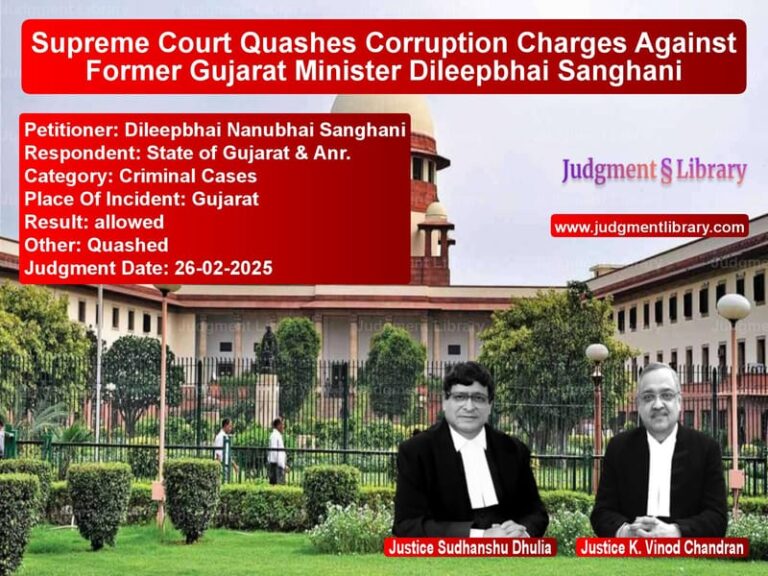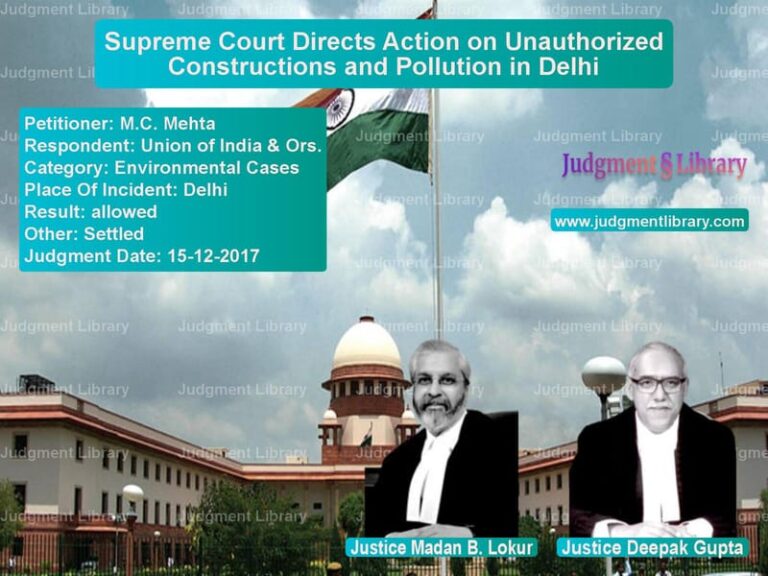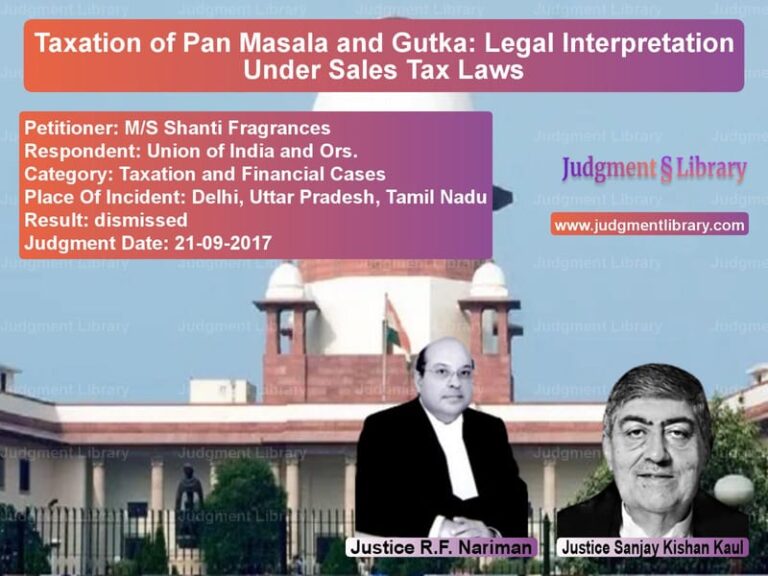Supreme Court Dismisses 16-Year-Old Land Dispute Claim Against Haryana Government
The Supreme Court of India recently delivered a judgment in the case of Bani Amrit Kaur v. State of Haryana & Ors., addressing a long-standing land dispute dating back to 1956. The case revolved around the validity of a sale deed executed by the appellant’s predecessor-in-interest and whether it was executed without proper legal authority.
Background of the Case
The appellant, Bani Amrit Kaur, challenged a judgment of the Punjab and Haryana High Court that had reversed the decisions of the trial court and first appellate court. The dispute concerned a land transaction that took place in 1956 when the father of the appellant’s predecessor, Sukhjit Singh, sold a piece of land without obtaining prior permission from the court, as required under Section 8 of the Hindu Minority and Guardianship Act, 1956.
The land in question, measuring 166 kanals and 15 marlas, was sold to Harjit Singh. Subsequently, Harjit Singh transferred 118 kanals and 6 marlas to the State of Punjab (now in Haryana) for ₹14,784 via a second sale deed executed on March 1, 1958. The remaining land was given to Harjit Singh’s mother, Davinder Kaur. Possession of the land was handed over to the new owners.
Read also: https://judgmentlibrary.com/supreme-court-allows-secondary-evidence-in-land-sale-agreement-dispute/
Legal Challenge by the Appellant
On October 3, 1972, Sukhjit Singh filed a civil suit challenging the 1956 sale deed, arguing that:
- His father, Gurinder Singh, executed the sale deed while he (Sukhjit Singh) was a minor.
- The sale was not conducted in compliance with Section 8 of the Hindu Minority and Guardianship Act, 1956.
- The sale was neither for necessity nor for the welfare of the minor.
The trial court ruled in favor of the plaintiff (Sukhjit Singh), declaring the sale deed invalid. This decision was upheld by the first appellate court. However, the Punjab and Haryana High Court overturned the lower court decisions, holding that the suit was time-barred and lacked merit.
Arguments by the Appellant
The appellant, represented by legal counsel, contended:
- The High Court erroneously relied on oral evidence regarding Sukhjit Singh’s date of birth rather than documentary evidence.
- A certificate from Doon School, Dehradun, recorded Sukhjit Singh’s date of birth as August 16, 1951. Based on this, the suit was filed within three years and two months of Sukhjit Singh attaining majority.
- The High Court’s conclusion that the suit was time-barred was erroneous.
- The sale deed should have been invalidated since no prior court permission was obtained.
Arguments by the Respondents
The State of Haryana, as a respondent, argued:
- The suit was initiated purely for financial gain, aiming to extract additional compensation from the State.
- The land was sold under similar conditions as other lands acquired by the State, and all due payments were made.
- The plaintiff (Sukhjit Singh) never produced documents proving ownership of the land at the time of the sale.
- The sale was executed in good faith by Sukhjit Singh’s father, Gurinder Singh, to finance his son’s education at Doon School.
- The case was an attempt to exploit a transaction that had occurred 16 years prior.
Supreme Court’s Analysis
1. Date of Birth and Limitation Period
The Court observed that while the High Court had relied on oral evidence to determine Sukhjit Singh’s age, the Doon School certificate provided by the appellant clearly showed the birth date as August 16, 1951. Based on this, the suit was not barred by limitation.
2. Validity of the Sale Deed
The Supreme Court found the suit to be misconceived because:
- Sukhjit Singh never provided documentary evidence proving that the property had been transferred to him before the sale.
- The sale deed merely included a recital that Gurinder Singh was acting as a guardian for his minor son.
- The land was never officially recorded in Sukhjit Singh’s name.
3. Bona Fide Purchase by the State
The Court noted that the State of Haryana had acquired the land in 1958 after due diligence and proper transactions. The land was purchased from Harjit Singh, who was the recorded owner at the time. Thus, the State was a bona fide purchaser protected under Section 41 of the Transfer of Property Act, 1882.
4. Delay in Challenging the Sale
The Court emphasized that challenging a sale deed 16 years after its execution raises questions about the appellant’s motives. It stated:
“The burden in such cases is heavy on the plaintiff who seeks to challenge the sale transaction entered into 16 years back.”
5. Attempt to Extract Additional Compensation
The Court observed that the appellant rejected the State’s ₹1 crore settlement offer and instead claimed that the land’s present market value exceeded ₹15 crore. The Court remarked:
“She seems to be too greedy.”
Final Judgment
The Supreme Court dismissed the appeal and upheld the Punjab and Haryana High Court’s judgment, stating:
- The appellant failed to prove ownership at the time of sale.
- The land was sold for the welfare of the minor.
- The transaction was valid under the Transfer of Property Act.
- The claim was filed too late and lacked merit.
Thus, the Supreme Court reaffirmed that once a bona fide land transaction is completed and validated by due process, belated challenges cannot be entertained, especially if motivated by financial gain.
Petitioner Name: Bani Amrit Kaur.Respondent Name: State of Haryana & Ors..Judgment By: Justice Vikram Nath, Justice Rajesh Bindal.Place Of Incident: Haryana.Judgment Date: 29-11-2023.
Don’t miss out on the full details! Download the complete judgment in PDF format below and gain valuable insights instantly!
Download Judgment: bani-amrit-kaur-vs-state-of-haryana-&-o-supreme-court-of-india-judgment-dated-29-11-2023.pdf
Directly Download Judgment: Directly download this Judgment
See all petitions in Property Disputes
See all petitions in Landlord-Tenant Disputes
See all petitions in Succession and Wills
See all petitions in Contract Disputes
See all petitions in Damages and Compensation
See all petitions in Judgment by Vikram Nath
See all petitions in Judgment by Rajesh Bindal
See all petitions in dismissed
See all petitions in supreme court of India judgments November 2023
See all petitions in 2023 judgments
See all posts in Civil Cases Category
See all allowed petitions in Civil Cases Category
See all Dismissed petitions in Civil Cases Category
See all partially allowed petitions in Civil Cases Category







